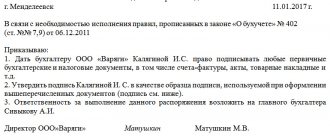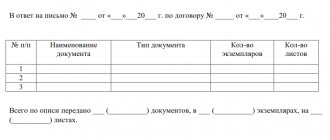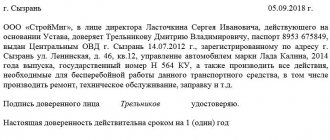Samples of powers of attorney for the right to sign documents for the director of an LLC
ATTENTION! Look at the completed sample power of attorney for the right to sign for the director:
You can DOWNLOAD samples of powers of attorney for the right to sign documents for the director of an LLC using the links below:
- power of attorney for the right to sign documents for the general director of the LLC
- power of attorney for the right to sign documents for the executive director of the LLC
- power of attorney for the right to sign documents for the commercial director of the LLC
- power of attorney for the right to sign documents for the financial director of the LLC
How to properly issue a power of attorney
The content of the power of attorney is determined depending on the extent of the powers of the legal directors. persons
Below we will consider what legal requirements should be observed by authorized persons in the case of issuing a power of attorney for the right to sign a director of a legal entity. faces
In the power of attorney, the represented person must indicate:
- date of registration, otherwise the document becomes invalid,
- place of execution and justification of the extradition,
- company,
- information about the principal (job position, full name),
- information about the attorney,
- a list of documentation confirming the identity of the attorney, as well as documents that the attorney is required to sign in the future,
- validity period, otherwise the document will lose validity some time after issuance,
- signature of the attorney and director of the company,
- seal of the LLC with a note about inclusion in a special journal.
The list of delegated powers indicates a package of documents that the attorney is required to sign. The last person in the company receives the authority to sign papers not only on the basis of a power of attorney, but also on the basis of an internal order.
From financial
A package of documents that comply with powers, statutory requirements, and orders.
Notarized power of attorney for representation of interests
How to draw up a power of attorney for an insurance company from a legal entity, read here.
How to draw up a power of attorney for Sberbank from a legal entity, read the link: https://novocom.org/dokumenty/doverennosti/doverennost-v-sberbank-ot-yuridicheskogo-lica-obrazec-2018.html
Important! In almost all companies, the chief accountant has the right to sign the second signature. The charter, as well as a special order, contains a list of documents that are strategically important for the enterprise, which the director of the company can entrust to other citizens to sign.
From the General
Contains a specific list of documents to be signed by an attorney. If the list, approved by seals and not included in the special register of the LLC, does not include papers, then the latter are not entrusted for signing. To do this, this power of attorney must be certified.
Since the general director is endowed with a wide range of responsibilities and rights, special attention is paid to entering information on behalf of the general director. Typically, this power of attorney allows the representative to carry out a specific task for a limited period of validity.
General power of attorney for all powers.
From commercial
In addition to the main content, it includes:
- information about the type of documents that are trusted to be signed by another citizen,
- a note regarding certification by an authorized person.
From the executive
Contains information (link to the constituent document, orders regulating the issuance of such documents) regarding the need for issuance. The power of attorney is certified by the general director and the constituent meeting.
Important! Trust papers must have content that must be agreed upon at a higher level, and the powers that are transferred to another person must not exceed the powers of the represented persons.
How to correctly delegate the right to sign civil contracts and personnel documents
Let's start with the simplest option - signing various civil contracts.
The general rule that the contract on behalf of the company is signed by its director (Article 53 of the Civil Code of the Russian Federation) is fully applicable here. But at the same time, the director can delegate this right to any other person. To do this, it is enough to issue a corresponding power of attorney on behalf of the organization (Article 185 of the Civil Code of the Russian Federation). Please note that a power of attorney can be drawn up not only for an employee of an organization, but also for a person who is not on the staff of the organization and does not even have a civil contract with it. Moreover, a power of attorney can also be issued to a legal entity.
In this case, the head of the authorized company or a person appointed by him (also on the basis of a power of attorney) will be able to act on behalf of the company.
The general rules for drawing up a power of attorney for signing contracts are given in Article 185.1 of the Civil Code (note that the same provisions apply when drawing up powers of attorney for most other purposes, for example, for tax purposes).
So, a power of attorney on behalf of a legal entity is issued in simple written form (except for cases when powers are transferred to complete a transaction that requires notarization, or to sign various documents related to registered real estate - in these cases, the power of attorney will have to be certified by a notary). There are no unified forms for power of attorney. This means that the company can develop the necessary samples itself. They do not need to be approved by any internal administrative document. This is explained by the fact that a power of attorney is not a primary accounting document, since it does not confirm any business transactions. Thus, if necessary, the company can always quickly supplement or change the form of the power of attorney.
Of the mandatory details for a power of attorney, the Civil Code of the Russian Federation names only the signature of the head of the organization and the date of issue of the document (clause 4 of Article 185.1 and clause 1 of Article 186 of the Civil Code of the Russian Federation). Neither the validity period of the power of attorney, nor the sample signature of the authorized person, nor the grounds for the transfer of powers are mandatory details, but can be included in the text of the document if the principal considers it necessary.
From the general provisions on a power of attorney it follows that it must contain the essence of the delegated powers, as well as the data of the authorized person and the person who issued the power of attorney.
In practice, to identify a legal entity (both the principal and the authorized person), the power of attorney indicates its organizational and legal form, company name, OGRN and Taxpayer Identification Number.
And to identify an individual as a trustee - his last name, first name and patronymic (in full), date and place of birth, place of residence, as well as passport details (series, number, date of issue and details of the unit that issued the document (name and number)) .
Accordingly, the power of attorney will be valid only upon presentation of the passport of the authorized person (which, by the way, also contains a sample signature - which is why it is not required in the power of attorney).
Additionally, the power of attorney can reflect its validity period. If this is not done, then it will be valid for exactly one year from the date of issue (clause 1 of Article 186 of the Civil Code of the Russian Federation). Please note that absolutely any period can be specified in the power of attorney: the legislation does not provide for either minimum or maximum values.
At the same time, it is impossible to establish the duration of the power of attorney in the form of an event (for example, receipt of goods or signing of an agreement), since such an approach contradicts the general rules of Article 190 of the Civil Code of the Russian Federation. This article allows the period to be determined by indicating only an event that must inevitably occur, that is, it cannot depend on the will and actions of the parties (clause
4 information letter of the Presidium of the Supreme Arbitration Court of the Russian Federation dated January 11, 2002 No. 66).
Let's summarize. The right to sign civil documents on behalf of an organization can be transferred to any person. The transfer is formalized by a written power of attorney signed by the head of the organization. There is no unified form for this document. The organization determines the validity period of the power of attorney independently, based on specific circumstances.
Signing personnel documentation
The Labor Code does not contain direct rules regulating the transfer of powers of the head of an organization to sign employment contracts and other personnel documents to other persons, but repeatedly mentions the very possibility of such a transfer.
Thus, Article 20 of the Labor Code of the Russian Federation determines that the rights and obligations of the employer in labor relations can be exercised, among other things, by authorized persons.
At the same time, it is said that the powers of such persons are formalized in the manner established by the constituent documents of the organization and local regulations.
And in Article 57 of the Labor Code of the Russian Federation it is noted that one of the mandatory conditions of an employment contract is information about the representative of the employer who signed the employment contract, and the basis by which this representative is vested with the appropriate powers. However, this article does not contain any specification of the procedure for delegation of powers.
The possibility of signing orders and other local regulations on personnel matters not only by the head of the organization, but also by another authorized person is also indicated by the by-laws that regulate the procedure for filling out primary accounting personnel documentation. For example, in the Instructions for the use and completion of forms of primary accounting documentation for recording labor and its payment (approved.
Resolution of the State Statistics Committee of Russia dated January 5, 2004 No. 1; further - Instructions for filling out unified forms) it is said that the employment order (Form No. T-1) can be signed not only by the manager, but also by an authorized person. However, these Instructions do not stipulate how to formalize the authority of such a person, and what changes need to be made to Form No. T-1 if it is signed by an authorized person.
Unfortunately, the Plenum of the Supreme Court of the Russian Federation in its resolution of March 17, 2004 No. 2 “On the application by the courts of the Russian Federation of the Labor Code of the Russian Federation” also did not answer the question of how to formalize the delegation of the right to sign personnel documents.
Paragraph 12 of this resolution only states that the representative of the employer is a person who, in accordance with the constituent documents of a legal entity or local regulations or by virtue of an employment contract concluded with this person, is endowed with the appropriate powers.
In other words, in order to transfer the right to sign personnel documents, it is necessary to provide for the procedure for such transfer in the local regulatory act of the organization or make a corresponding clause in the employment contract concluded with an authorized person.
However, the judges of the Supreme Court of the Russian Federation did not specify what specific documents can be used to confirm the temporary transfer of powers of a manager, and in particular, whether it is necessary to issue a power of attorney to an authorized person.
There are no formal grounds for issuing a power of attorney in this case, since labor legislation does not contain such a requirement. The provisions of Article 185 of the Civil Code of the Russian Federation that a power of attorney is issued to delegate the powers of a manager are not mandatory when transferring powers to sign personnel documents.
Indeed, by virtue of the provisions of Article 5 of the Labor Code of the Russian Federation, labor relations are regulated by labor legislation, which consists of the Labor Code, other federal laws and laws of constituent entities of the Russian Federation containing labor law norms.
That is, the Civil Code, which contains norms of civil (and not labor) law, is not a normative legal act regulating labor relations.
However, courts do not always recognize that in order to transfer the authority of a manager to sign personnel documents, it is enough to issue an appropriate local regulatory act (for example, an order). Often, arbitrators require that in this case an additional power of attorney be issued to the authorized person (see.
Resolution of the Federal Antimonopoly Service of the Moscow District dated 01/09/04 No. KG-A41/10211-03). Although sometimes organizations still manage to defend in court personnel decisions made by an authorized person who acted only on the basis of an order (see resolution of the Federal Antimonopoly Service of the East Siberian District dated 12.03.
09 No. A19-7218/07-57-5-52-F02-826/09).
Let's draw a conclusion. To avoid challenging and recognizing as illegal personnel decisions made by an authorized person, it is better to issue a power of attorney for him. Moreover, this does not contradict the law.
After all, it is clear that an authorized person, when signing employment contracts, local acts and other personnel documents, does not act on his own behalf, but represents the interests of the employing organization. And legislative regulation of the issue of representing the interests of a legal entity before third parties is provided only by the norms of the Civil Code.
Therefore, if an organization, in order to avoid risks, decides to issue a power of attorney to sign personnel documents, then when drawing it up, it is necessary to take into account the provisions of the Civil Code of the Russian Federation on power of attorney.
In the power of attorney issued to the authorized person, it is necessary to indicate exactly what actions in the “personnel department” on behalf of the organization he has the right to perform, and to establish the term of office.
It is also advisable to note that the authorized person acts on behalf of the organization not as an individual, but as an employee of the organization holding a certain position.
This will not allow him to abuse the granted rights in the event of dismissal, and will also limit the scope of the power of attorney to the “territory” of the organization, since information from the company’s staffing table will be needed to confirm his powers.
The wording of the power of attorney in this case may be as follows:
Limited Liability Company "Lazurit-FS" represented by Director Dmitry Anatolyevich Nikolaev, acting on the basis of the Charter, authorizes Ivan Dmitrievich Petrov (indicate passport details, date and place of birth, place of residence, etc.), holding the position of head of the department, with this power of attorney personnel of the Limited Liability Company "Lazurit-FS",...
Let's summarize. Labor legislation provides for the possibility of transferring the manager’s authority to sign personnel documents to third parties.
At the same time, the Labor Code of the Russian Federation does not give a clear answer to the question of how to formalize the delegation of powers of the head of an organization, requiring only that the procedure for such delegation be fixed in local regulations or constituent documents. Judicial practice often requires additional execution of a power of attorney.
Since the authorized person in the situation under consideration represents the interests of the legal entity, and the procedure for registering such representation is fixed in the Civil Code, then in the case of delegation of authority to sign personnel documents, the power of attorney is drawn up according to the rules provided for by this code.
How is the signature of an authorized person drawn up?
Let us separately dwell on the peculiarities of the execution of the documents themselves, endorsed by an authorized person.
When a representative acts under a power of attorney, the “header” of the civil law contract is drawn up as follows. The principal organization is indicated as a party to the agreement, and then it is stipulated that a representative acts on its behalf under a power of attorney. In this case, the details of the power of attorney (date, number, if any) are entered into the text of the agreement.
Detailed information about the authorized person (date, place of birth, place of residence, etc.) may not be indicated in the contract. But sometimes it's better to do it. For example, if we are talking about large transactions or real estate transactions that are subject to registration.
Information about the authorized person is entered into the contract in strict accordance with how it is indicated in the power of attorney.
The header of an agreement concluded by a trustee on behalf of an organization may look like this:
Limited Liability Company "Lazurit-FS" represented by Dmitry Anatolyevich Nikolaev (if necessary, indicate his passport details, date and place of birth, etc.), acting on the basis of a power of attorney dated September 16, 2016...
Representation is formalized somewhat differently when an authorized person signs unilateral documents on behalf of the principal, for example, statements, claims, etc. In this situation, the inscription “representative by proxy” is written directly next to the signature and the details of the power of attorney are displayed.
As for personnel documentation, here too the procedure for signing the authorized representative depends on the type of document. Thus, when drawing up employment contracts, exactly the same approach is used as when drawing up civil law contracts.
That is, the header of the employment contract indicates that it was concluded by a legal entity on whose behalf an authorized representative acts. And in order for an authorized person to sign other personnel documents (for example, orders), you can make appropriate changes to the “signature” attribute of the issued document.
That is, such an order will indicate not “Head of the organization”, but “Authorized person”, and will also add fields to reflect the details of the power of attorney.
But you can go another way. As already noted, the Instructions for filling out unified forms directly provide for the possibility of signing such forms not by the manager, but by an authorized person. But at the same time, there are no reservations in the Instructions that in this case it is necessary to change the “signature” attribute of the form itself.
Therefore, we can draw the following conclusion: the authorized person has the right to put his signature in the appropriate column instead of the manager’s signature. That is, no changes need to be made to the form. And the powers of the signatory if necessary (at the request of the employee, labor inspectorate, court, etc.
) will be confirmed by order and power of attorney.
Source: https://www.Buhonline.ru/pub/beginner/2016/9/11537
Who should compile
The document in question is subject to registration in accordance with the legislative norms of the Russian Federation and is drawn up by legal employees. department (lawyers of the firm).
The document must be signed by an official authorized to grant another citizen the right to sign certain documents in his place. This paper is certified in accordance with the procedure described in the charter, or with a special order.
Attention! Our qualified lawyers will assist you free of charge and around the clock on any issues. Find out more here.
Who can I write to?
Such documents are usually issued by legal entities. persons addressed to the following employees:
- legal workers department, lawyers:
- chief accountants,
- heads of departments, etc.
In some circumstances, officials issue powers of attorney in the name of another person with the right to delegate powers. In such circumstances, these documents must be certified by a notary.
For the same reason, managers most often decide to draw up the document in question in the name of several attorneys at once.
Power of attorney for personnel employees
Sign orders related to the production activities of the enterprise as they relate to personnel. 3. Sign additional agreements to employment contracts. 4. Sign notices of changes to the basic terms of the employment contract. 5.
Sign agreements between the employee and the employer on changes to the basic terms of the employment contract. 6.
Sign contract agreements with citizens of the Russian Federation, with foreign citizens who arrived in the Russian Federation in a manner that does not require a visa and have the right to carry out labor activities in the Russian Federation. 7.
Sign attachments, additions, acts of work performed to the contracts specified in clause 6 of this power of attorney. 8. Certify entries in work books when dismissing employees. The power of attorney was issued for a period of 1 (one) year. The powers under this power of attorney cannot be transferred to third parties.
Read more about signing personnel documents here: In addition, personnel documentation also applies to more important documents, such as employment contracts or dismissal documents. What to do in this case so that the document is signed and there are no problems with employees? In this case, the following conditions must be observed:
- it is necessary that the organization’s statutory internal documents indicate that in the absence of the manager, a deputy or authorized person can sign personnel documents;
- availability of a power of attorney on behalf of the head of the organization in the name of the deputy or any other authorized person to sign personnel documentation.
So, in order to understand how to issue a power of attorney for the signature of another person, first, you need to understand what a power of attorney is in general.
Main features of the document
The head of the enterprise issues a power of attorney of 2 types:
- general, according to which the representative is granted powers without restrictions,
- special, according to which the attorney receives the opportunity to assign orders within a designated time period,
- a one-time power of attorney, according to which the attorney is given the opportunity to perform a specific task.
When drawing up the document under consideration, according to which the representative can sign specific documents, these documents must be entered in the power of attorney very clearly. It is recommended that each document be included in the power of attorney in a separate subparagraph.
Is it possible to revoke a general power of attorney?
The document in question is presented to the following enterprises:
- in the state organizations (judicial authority, tax office, post office, extra-budgetary fund and other government organizations),
- to commercial enterprises (banking institution, other legal entities).
Please note that there are no legal provisions for filling out the document in question. Despite this, the document is drawn up according to the rules recommended in office work.
So, the document in question includes data on:
- represented person,
- attorney,
- validity period of the document.
The document in question is signed by both parties: both the represented person and the representative.
It must be taken into account that the wider the powers of the representative, the more detailed information about the representative is indicated in the paper.
Features of using the document
A properly executed power of attorney significantly simplifies the work of the enterprise, and especially its paperwork. By completing just a few documents, for example, for a deputy and an accountant, the manager saves himself from a significant part of the formal paperwork.
If the document specifies a validity period, but for some reason the principal decides to revoke the authority of the attorney, he has the right to revoke it at any time. To do this, you need to give written notice of the revocation of the power of attorney, seize a copy of it from the attorney and record in the document that the act is no longer valid.
Validity
It should be noted that the power of attorney has a limited validity period, which can be seen in the form of this document. The latter becomes invalid upon expiration of a 3-year period from the date of issue of this power of attorney.
Remember! If the power of attorney does not indicate a specific period of its validity, then it loses legal force after one year from the date of issue of this document.
The legislation defines the circumstances under which a power of attorney for the right to sign documents becomes invalid.
So, the document becomes invalid if:
- the validity period has expired,
- the action was canceled by the represented person,
- the attorney renounced the power of attorney,
- there has been a liquidation or reorganization of the company that is the represented person,
- the person to whom the power of attorney was issued died,
- the represented person (or attorney) was declared incompetent, partially capable or missing person,
- representative died.
How to draw up a general power of attorney to represent the interests of a legal entity?
What is the procedure for terminating a power of attorney?
The procedure for terminating a power of attorney is specified in paragraphs 1-2 of Article 188 of the Civil Code of Russia. In particular, the law states that the validity of this document is completely terminated if the person who issued it cancels his decision.
The procedure for terminating the power of attorney is prescribed in clause 1 of Art. 189 Civil Code of the Russian Federation:
- the power of attorney has expired;
- the principal canceled the document itself;
- the representative has waived his rights and obligations under this document;
- the legal entity that issued the order no longer operates;
- the organization that received the power of attorney is not working;
- the person who issued the power of attorney is mentally ill;
- in the event of death of the principal, his incapacity or partial incapacity, as well as the unknown location of the person himself.
Attention! Termination of a power of attorney occurs from the moment the representative’s powers expire.
Third parties with whom he dealt on behalf of the principal must also be notified of the termination of the representative’s duties. Exactly the same obligations apply to the heirs or legal successors of the principal.
What company documents are not signed for the director?
Documents that are not signed by the head of the enterprise are those papers that are addressed to the Federal Tax Service and are intended for state purposes. legal registration faces.
Subp. “a”, clause 1.3 of article F.Z. No. 129-FZ establishes that these papers are sent to the authorized body by the director or other person who is authorized to carry out actions on behalf of the company without issuing a power of attorney.
In addition to the director, this right is vested in:
- persons who are the founders of the enterprise,
- persons who are bankruptcy trustees,
- management of the enterprise, which is the founder of the company, which is subject to state registration,
- persons who are authorized to register a company by law or by virtue of legal provisions determined by a state or municipal authority.
It should be noted that if the charter does not establish a legal provision regarding the prohibition of the transfer of directorial powers to sign accounting or financial statements, then a power of attorney must be issued.
Watch the video. How to challenge a signature in a contract:









